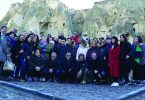What is the founding purpose of Zeytinburnu Medicinal Plants Garden which is a first in Turkey?
Zeytinburnu Medicinal Plants Garden is the first active medicinal plant garden in Turkey. Opened in 2005 with contributions of Zeytinburnu Municipality and Merkezefendi Traditional Medicine Association, our garden aims what an academic botanical garden aims. In the garden; we aim to study and cultivate the plants, ensure the growth and spread of new ones, to protect those under risk, to contribute to biodiversity, to encourage people to recognize medicinal plants and make them a part of the culture, and to train people on cultivation, and efficient and safe use of medicinal plants by benefiting from medical flora. Currently, around 700 medical and aromatic plant species are cultivated in the garden. In selection of plants, those endemic to Anatolia have priority. We work to ensure the adaptation of the seeds and seedlings obtained from nature, reliable institutions and horticulturists, or through donations, flora excursions organized to collect plant species and learn about ethnobotany, and seed exchange festivals, to the climate and soil conditions in the Garden. We contribute to survival of local seeds with seed exchange festivals organized or participated by ZEYTİNBURNU MEDİCİNAL PLANTS GARDEN.
How do you provide the habitat in Zeytinburnu Medicinal Plants Garden where 700 plants are cultivated? Could you inform us about the activities of the Garden?
In our garden, each plant is grown in the most suitable island-parcel. Plants from tropical and subtropical climates are in the large greenhouse. There is also a production greenhouse. In addition to island-parcels, there is a site for bulbous plants, a low tunnel, a rock garden, a vegetable garden, and nursery. We do not use synthetic fertilizers, herbicides and pesticides in the garden; plant matter is utilized as natural fertilizer, and we apply natural solutions against pests. We use drip and sprinkler irrigation methods. Parts of plants used for medical purposes are harvested, dried, kept in freezer and preserved in drug lockers by our personnel. The plants collected while in bloom are dried, fixed on special cardboards, kept in freezer, and take their place in the herbarium (dried plants collection). In addition, the morphology and anatomy of plants are studied in the laboratory, essential and fixed oils are obtained. Tinctures, ointments, creams, perfumes, colognes, and soaps are produced as well as kefir, and saps are processed against plant pests. Our personnel, interns and trainees can benefit from the herbarium and laboratory.
With seminar halls, specialization library, sundial and nature calendar which are original structures that explain the natural cycle, especially the small animal shelter that makes it easier for children to perceive nature as an ecosystem, Garden is an educational institute for all ages. Visitors distinguish the plants by labels, and learn which parts of the plant are medicinal and can be used for other purposes. Every year, tens of university students from related disciplines make their internship in our garden. We also carry out a voluntary gardening program. In this context, Garden also offers those who have never had a chance to closely know the soil and plants, the opportunity to be close to the nature as well as equipping them with agricultural knowledge and practical skills. Some of our volunteers start growing medicinal plants in their fields, gardens or balconies.
Are there organizations you support as Zeytinburnu Medicinal Plants Garden?
Our garden has provided dozens of university students with thesis support, hundreds of students from elementary school to university with project support, and many other schools to date. In addition, our Garden offers consultancy and material assistance for realization of similar projects in various regions of Turkey. We have given seed, seedling, drug, herbarium, personnel and consultancy support to various institutions such as universities, institutes, centres, botanical gardens, municipalities, parks, museums, national palaces and mansions. We provided consultancy and material support to Afyonkarahisar Medicinal and Aromatic Plants Centre under the Ministry of Forestry and Water Affairs, from the project design on. We participated as a stakeholder in the project of establishing Bezmiâlem Phytotherapy Training, Application and Research Centre, which offers physicians certification trainings approved by the Ministry of Health. At the same time, we make efforts to make phytotherapy widespread and a part of our health system, and to produce standardized herbal products that can be prescribed.
As Zeytinburnu Medicinal Plants Garden, you host a number of trainings under the title of the School of Health and Environment. Could you inform us about this program?
By organizing seminars, workshops and programs for children in the School of Health and Environment, we aim to educate the participants so that they can protect their well-being and environment by living a greener life. We also aim for them to produce natural and simple health remedies at home where appropriate, without further burdening the professional health system, as taught in the Home Medicine Seminars. We pay attention to the content of trainings so they appeal to everyone. However, in some areas as “Phytotherapy” and “Aromatherapy” we organize trainings aimed at physicians and pharmacists. There are trainees who find a related job or start a business after the training at the Garden. Our project Köşe Bucak Börtü Böcek was a project for children on insects which was included in TUBITAK Nature Education and Science Schools program. We carry out Minik Eller Toprağa (Little Hands in Soil) workshop with nearly 20 schools each year. Nearly one thousand trainees have planted and grown plants to date with our support.
Every year you organize the Traditional Merkezefendi Medicine Festival. What are the activities held in this festival?
The medical program of the Traditional Medicine Festival, organized in early summer each year since 2000, is carried out by Medicinal Plants Garden. The festival takes start with distribution of mesir paste, and survives this tradition initiated by Merkezefendi. Every year, an exhibition with a different theme from the history of medicine is organized, and an exhibition booklet is published. Seminars, workshops and programs for children are held throughout the festival. Towards the end of the festival, a Symposium on History and Museums of Medicine is organized and the presentations made here are later published. A fair where natural products are sold and a traditional cooking contest are also organized at the festival.









Leave a Comment